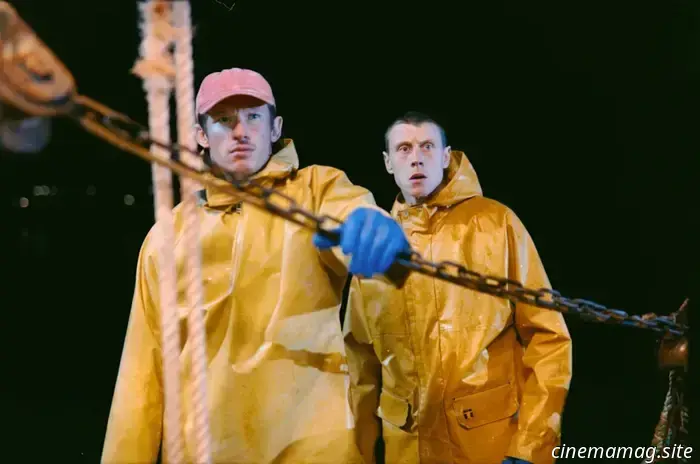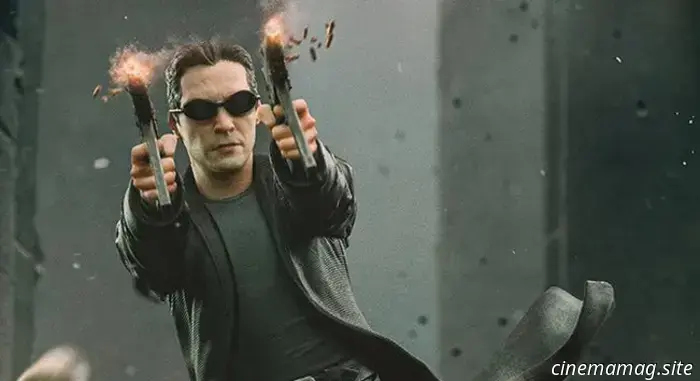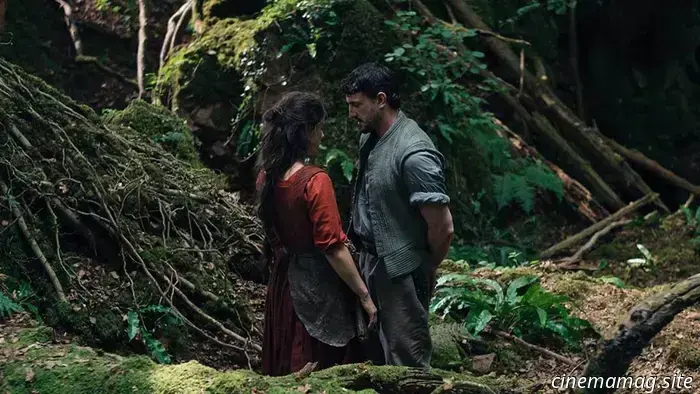
Venice Review: Mark Jenkin’s Rose of Nevada is an Astonishing, Time-Bending Ghost Tale
The films of Mark Jenkin possess a mesmerizing, disorienting quality; viewing them immerses you in their erratic shifts through time and space, transforming his home area of Cornwall into a suspended realm where reality and imagination intertwine in astonishing displays. The director weaves meandering narratives, driven not by straightforward plots but by ambient elements: the ticking of a clock, the rustle of the wind, the far-off sound of waves crashing. His dramas often direct your attention away from the characters and toward the inanimate objects scattered around them. It is in the space between the fictional foreground and the non-fictional background that the true narrative often unfolds.
It is fitting that his latest film, Rose of Nevada, begins not with a face but with a series of textures: an extreme close-up of a seawall, an anchor covered in rust, chains, boats, and two boots on a pier—those belonging to Mike (Edward Rowe), one of the few remaining residents of a seaside ghost town in Cornwall. The region's rapid depopulation has been a recurring theme in the filmmaker's body of work, consistently highlighting how rising costs, unchecked tourism, and gentrification have driven away its native inhabitants. This was the impetus behind Jenkin's exceptional 2015 short Bronco’s House, where a young man returns to his village and struggles to find affordable housing, and it also inspired his 2019 breakthrough feature Bait, featuring a fisherman at odds with holidaying Londoners who have taken over his childhood home and pushed him to the margins of the town.
This same force drives Rose of Nevada, which serves as a culmination of Jenkin’s interests in the erosion of Cornwall’s traditional ways of life and the resilience of local communities in the face of such losses. As the eponymous fishing boat mysteriously reappears at the old harbor, 30 years after it went missing at sea with its crew, Mike gathers a three-man team to venture it back out, hoping for a stroke of luck for the eerily deserted village. Nick (George MacKay) signs up to support his wife and daughter; Liam (Callum Turner) sees it as a chance to escape his past. They are joined by skipper Murgey (Francis Magee), a seasoned sailor more than twice their age. However, upon returning from their first trip, they sense that something is out of place—the journey seems to have pulled them back in time, and the village welcomes them as if they were the original crew.
This concept is not particularly groundbreaking. Even when ostensibly set in the present, Jenkin’s films often feel anchored in an indeterminate past, and in Rose of Nevada, certain items in Nick’s room—like an old poster, a tape player, and some cassettes—hint at a previous era long before the boat sends him spiraling back to the early 1990s. Yet, nothing accentuates that anachronism more than the film's visual style. Jenkin filmed Rose of Nevada using the same Bolex H16 camera that he employed for Bait and its sequel, Enys Men, which allows for a maximum of 28 seconds per take. While the visuals are more refined than those of the monochrome, hand-processed Bronco’s House and Bait, they still feature scratches and flashes from light leaks. To label these irregularities as simple flaws would be misleading; rather, they characterize Jenkin’s aesthetic and are the primary reason his films feel vibrantly alive.
Where many filmmakers might approach shooting on celluloid as an exercise in nostalgia, Jenkin’s method is anything but staid. I find it hard to articulate the enchanting sensation I experienced watching Rose of Nevada as it crossed the ocean, drifting dreamily into the past, or the film’s unique visual and auditory blend—how the jarring noise of the ship’s cranes mixed with the aged images of the men at sea and the family members left behind. Nevertheless, I understand that my reaction is closely tied to the tangible quality those frames conveyed, suggesting that what I was observing was not a mere relic but a work that acknowledged the medium’s physicality and vitality. Viewed against the backdrop of our hyper-digital 2020s, Jenkin stands out as a significant anomaly within the current media landscape. He is also one of the very few contemporary directors whose cinema feels both relatable and profoundly fresh.
Rose of Nevada made its debut at the 2025 Venice Film Festival.

Other articles
 Step into the Matrix with the Neo collectible statue from Iron Studios.
Iron Studios has revealed its 1:10 scale Neo statue, which draws inspiration from Keanu Reeves' portrayal in the original installment of the sci-fi action series, The Matrix. This collectible is currently available for pre-order at a price of $219.99; you can check it out here… Step into the Matrix with the Neo statue from Iron Studios’ BDS Art […]
Step into the Matrix with the Neo collectible statue from Iron Studios.
Iron Studios has revealed its 1:10 scale Neo statue, which draws inspiration from Keanu Reeves' portrayal in the original installment of the sci-fi action series, The Matrix. This collectible is currently available for pre-order at a price of $219.99; you can check it out here… Step into the Matrix with the Neo statue from Iron Studios’ BDS Art […]
 Preview of Jeff & Other Marvel Tails #1 - Comic Book
Marvel Comics will launch It's Jeff & Other Marvel Tails #1 next week, and you can check out the official preview below for an early look… THE MARVELOUS TALES OF JEFF THE LAND SHARK & FRIENDS! THE CUTEST AND GOOFIEST MARVEL COLLECTION TO DATE! This special three-in-one edition compiles episodes from the cherished Marvel Unlimited series: IT'S JEFF, [...]
Preview of Jeff & Other Marvel Tails #1 - Comic Book
Marvel Comics will launch It's Jeff & Other Marvel Tails #1 next week, and you can check out the official preview below for an early look… THE MARVELOUS TALES OF JEFF THE LAND SHARK & FRIENDS! THE CUTEST AND GOOFIEST MARVEL COLLECTION TO DATE! This special three-in-one edition compiles episodes from the cherished Marvel Unlimited series: IT'S JEFF, [...]
 Telluride Review: Chloé Zhao’s Hamnet Reinforces the Importance of Art
Hamnet is a remarkable piece of empathy and stands out as Chloé Zhao's most outstanding film by a considerable distance. Based on the 2020 novel by Maggie O'Farrell, who is back as a co-writer, the film beautifully illustrates the significance of art and how the experience of watching something can evoke emotions and foster understanding.
Telluride Review: Chloé Zhao’s Hamnet Reinforces the Importance of Art
Hamnet is a remarkable piece of empathy and stands out as Chloé Zhao's most outstanding film by a considerable distance. Based on the 2020 novel by Maggie O'Farrell, who is back as a co-writer, the film beautifully illustrates the significance of art and how the experience of watching something can evoke emotions and foster understanding.
 The Issue of Blockbuster Comic Book Movies: The Precipice of Box Office Revenue
Thunderbolts*, Superman and The Fantastic Four: First Steps executed everything correctly, so what led to this year’s comic book movie blockbusters underperforming at the box office? Hollywood has been navigating a post-COVID landscape for the past five years, grappling with an issue that was already escalating. There has been a decline in the number of viewers, especially among younger audiences, […]
The Issue of Blockbuster Comic Book Movies: The Precipice of Box Office Revenue
Thunderbolts*, Superman and The Fantastic Four: First Steps executed everything correctly, so what led to this year’s comic book movie blockbusters underperforming at the box office? Hollywood has been navigating a post-COVID landscape for the past five years, grappling with an issue that was already escalating. There has been a decline in the number of viewers, especially among younger audiences, […]
Venice Review: Mark Jenkin’s Rose of Nevada is an Astonishing, Time-Bending Ghost Tale
The movies of Mark Jenkin radiate a mesmerizing, disorienting vibe; viewing them envelops you in their erratic transitions through time and place, transforming his native Cornwall into a timeless realm where reality and imagination intertwine within astonishing dioramas. The filmmaker crafts meandering narratives, forever
